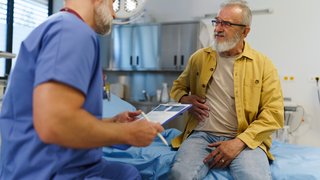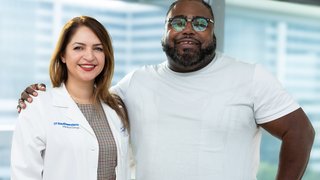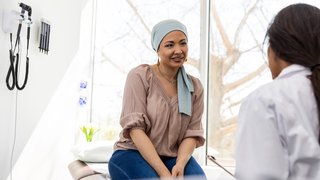'Previvors' find hope, answers at Genetic Cancer Prevention Clinic
November 13, 2024
Jennifer Lowrey is a real estate finance professional, wife, and mother of two. She’s also a cancer previvor – someone with an increased risk of developing cancer due to genetics – who has gained control over her future health.
In 2002 when Jennifer was 24, she lost both of her parents to cancer four months apart: her mother at age 50 after developing breast and colon cancer and her father at 62 of multiple myeloma. In 2014, she learned she had Lynch syndrome, a genetic mutation that means she is twice as likely as other women in the U.S. to develop cancer during her lifetime.
Jennifer started traveling regularly from Dallas to Cleveland, Ohio, for regular screenings and checkups, growing more anxious every year about a looming diagnosis of colorectal, uterine, or ovarian cancer – the most common types of cancer associated with Lynch syndrome. Jennifer’s biggest fears were that cancer would leave her children motherless at a young age and that they’d have to watch her die of cancer, like she did with her own mother.
The UT Southwestern Genetic Cancer Prevention Clinic (GCPC) within the Harold C. Simmons Comprehensive Cancer Center was founded in 2023 to help patients like Jennifer, who has been a UT Southwestern patient since 2017. The multidisciplinary center offers lifelong, interconnected care for patients who have a known genetic mutation causing increased lifetime cancer risks and have not yet been diagnosed with cancer or are in remission from cancer.
No one should have to live in fear of a cancer diagnosis. With the tools and technology available today, carrying a cancer risk-related gene mutation does not have to be a death sentence.
Through the Genetic Cancer Prevention Clinic, our centralized team of genetic counselors, health care providers, genetic nurse navigators, and mental health professionals gives patients hope and actionable next steps to break the cycle of generational cancers.
A primer on genetic cancers
Genetic or hereditary cancers are caused by mutations in genes that typically are inherited through families. It is estimated that 5%-10% of all cancers have a genetic component.
Lynch syndrome is an inherited cancer risk condition that increases a person’s chances of developing multiple types of cancer. It is caused by mutations, or breaks, of the MLH1, MSH2, MSH6, PMS2, or EPCAM genes, which support the ability of the cells’ DNA (genetic code) to repair itself and protect against cancer.
People with Lynch syndrome often develop cancer as early as in their 20s and throughout their lifetime. Their children have a 50% chance of inheriting Lynch syndrome.
Considering genetic testing? Start with our 3-question quiz on hereditary cancer risk.
What can genetic tests look for?
There are many examples of inherited cancer risk conditions that are equally likely in males or females and equally passed along in the genetic code.
● CHEK2 gene: These mutations can nearly double a female’s risk of breast cancer and have been associated with prostate cancer for males.
● BRCA1 or BRCA2 gene: Females who carry either of these mutations are four to five times more likely to develop breast cancer and 10 to 40 times more likely to develop ovarian cancer. Males have higher risks for breast and prostate cancers, among others.
● Cowden syndrome: It is associated with an increased risk of breast, thyroid, and endometrial cancers.
● Li-Fraumeni syndrome: It’s linked to a higher risk of breast, bone, and brain cancers.
● Von Hippel-Lindau (VHL) syndrome: This increases the risk of kidney, pancreatic, and adrenal cancers.

Genetic testing can help determine whether cancers in a family are inherited. Information gained from genetic testing can help guide cancer prevention and risk reduction options, such as regular screenings, lifestyle modifications, and preventive surgeries.
But for many patients, the amount of information they get from genetic testing can be overwhelming. Too often, patients are left to manage on their own, traveling to see specialists at separate offices – or even separate states, as in Jennifer’s case. And they live with the emotional weight of worrying about their own future health and their children’s health, without a clear path to do something about it.
We formed the Genetic Cancer Prevention Clinic within our Cancer Genetics Clinic so that patients like Jennifer can take action instead of waiting in fear for a life-changing diagnosis.
Jennifer's story: 'I finally have control over my health'

Living with Lynch syndrome
When I lost my parents, I struggled with grief, but I didn’t think about what their cancers meant for my future health.
My cousin changed that perspective in 2014, after she told me about a visit with a doctor who’d asked about our family medical history. When the doctor heard about my mother’s diagnoses, he immediately thought of Lynch syndrome and suggested that everyone in the family get genetic testing.
My results came back positive for Lynch syndrome, which meant I had a 60%-80% lifetime chance of getting cancer. At that time, I was pregnant with my second child. I was terrified that I would get cancer and that my children would inherit Lynch syndrome.
For the next couple years, I was so anxious that I cried myself to sleep. I would wake up in the middle of the night wondering whether I had developed cancer since my last screening. One particularly tough night, I reached out to an Instagram acquaintance who has Lynch syndrome. Her pearl of wisdom completely changed my outlook: “Knowledge is power.”
Having Lynch syndrome is scary. But knowing I have it is a gift. I can take steps now to prevent cancer or catch it early. My goal is to live a longer, healthier life and spare my kids the grief of losing a parent to cancer at a young age. And it’s all possible through the connected care at the Genetic Cancer Prevention Clinic.
Timeline for taking control of my cancer risk
● 2014: I was diagnosed with Lynch syndrome.
● 2015: I started traveling out of state every year to see a specialist I’d found online for cancer screenings. I was happy with the care, but traveling was expensive, and it disrupted my family life and career.
● 2017: I became a patient at UT Southwestern after my uncle introduced me to cancer genetic counselor Brian Reys, M.S., CGC, who is part of the Harold C. Simmons Comprehensive Cancer Center at UT Southwestern. I also began to see Ezra Burstein, M.D., Ph.D., Chief of the UTSW Division of Digestive and Liver Diseases, for my routine colonoscopies and upper gastrointestinal tract scopes.
● 2018: I got a total hysterectomy (uterus, fallopian tubes, and ovaries) from my long-time Ob/Gyn at another health care center, with the goal of preventing ovarian and uterine cancer.
● 2018: Brian Reys connected me with breast cancer expert Marilyn Leitch, M.D., who added an MRI to my yearly mammogram and sonogram. My mammogram and sonogram were scheduled six months apart from my MRI, so I never went more than half a year without being screened. Though Lynch syndrome is not associated with increased breast cancer risk, I wanted to cover my bases since my mother was diagnosed with breast and colon cancer before age 50.

● 2019: Loving my care with the cancer genetics program at Simmons Cancer Center, I started dropping hints that it would be amazing if there was a centralized hub to help patients navigate all these appointments and specialists. I was getting a lot of personal support, but it was still overwhelming at times. I really wanted a clinic that could coordinate my care long-term for all these cancer risks and regularly meet with a genetic counselor.
● 2021: I met with breast surgical oncologist Rachel Wooldridge, M.D., who is now the medical director of the GCPC. She so clearly explained my elective mastectomy options to prevent breast cancer that I decided I wanted one within hours of speaking to her. On surgery day, she made me feel comfortable and even invited me to play my favorite music (‘90s hip-hop) while I was being prepped!
● 2021-2022: Breast plastic surgeon Sumeet S. Teotia, M.D., reconstructed my breasts using the DIEP flap procedure, which transplants lower abdominal tissue to create new, natural breasts after mastectomy. When I mentioned to Dr. Wooldridge that I was having trouble sleeping in 2022, she immediately connected me to UTSW sleep specialists.
● 2023: The Genetic Cancer Prevention Clinic opened, and I began to see Luke Engelking, M.D., a specialist in Lynch syndrome. I like to think the clinic’s opening was due (in part) to me bringing up the idea so often. Now, all my care is centralized and simple. They coordinate all my care for cancer risks and handle all my appointment scheduling. They ensure that the providers I see are familiar with my personal and family health history – sharing the knowledge gives me better outcomes and more peace of mind.
The risk of cancer used to feel inevitably devastating. Now at 46, I am the same age that my mother was when she was diagnosed with breast cancer. With the GCPC team on my side, I finally have control over my health. The clinic is a special gem that more people need to know about.
What to expect at your first clinic visit
Before your first Genetic Cancer Prevention Clinic appointment, a nurse navigator will call you to discuss your family history and ensure the providers have a copy of your genetic testing results that confirm your specific gene and mutation.
Your first visit will be split into two parts:
● Talk with a genetic counselor about your genetic testing results and your specific mutations as well as your family history of cancer (if applicable). You may also discuss the need for expanded or updated genetic testing.
● See a health care provider to create a personalized cancer prevention plan that works for you. This conversation may include the timeline for screenings such as mammograms and colonoscopies, possible cancer risk reducing medications, cancer prevention procedures such as hysterectomy or mastectomy, and referrals to UTSW specialists if needed.

After the visit, the nurse navigator will follow up with you to answer questions, help you schedule your follow-up visit with the Genetic Cancer Prevention Clinic, and help you schedule other appropriate appointments.
In my 19 years as a certified genetic counselor, I’ve seen many patients like Jennifer Lowrey who struggled to balance the logistics of scheduling appointments with the emotional weight of dreading a cancer diagnosis. Without a central hub for genetics expertise and care, health care providers who may not be trained in genetics may have trouble seeing the full picture of care, which results in undue stress for everyone.
The Genetic Cancer Prevention Clinic provides personalized, actionable steps for cancer prevention. Our genetic counselors and clinical care teams work together to give every patient and their providers a clear care plan, guided by what matters most to each individual patient.
No one should have to live in fear, awaiting a genetic cancer diagnosis – we’re here to support every patient and previvor, every step of the way.
Sara Pirzadeh-Miller, M.S., CGC, is the Director of the Cancer Genetics program at UT Southwestern Medical Center.
To request an appointment at the Genetic Cancer Prevention Clinic or get more information about genetic testing, call 214-645-2563 or request an appointment online.











